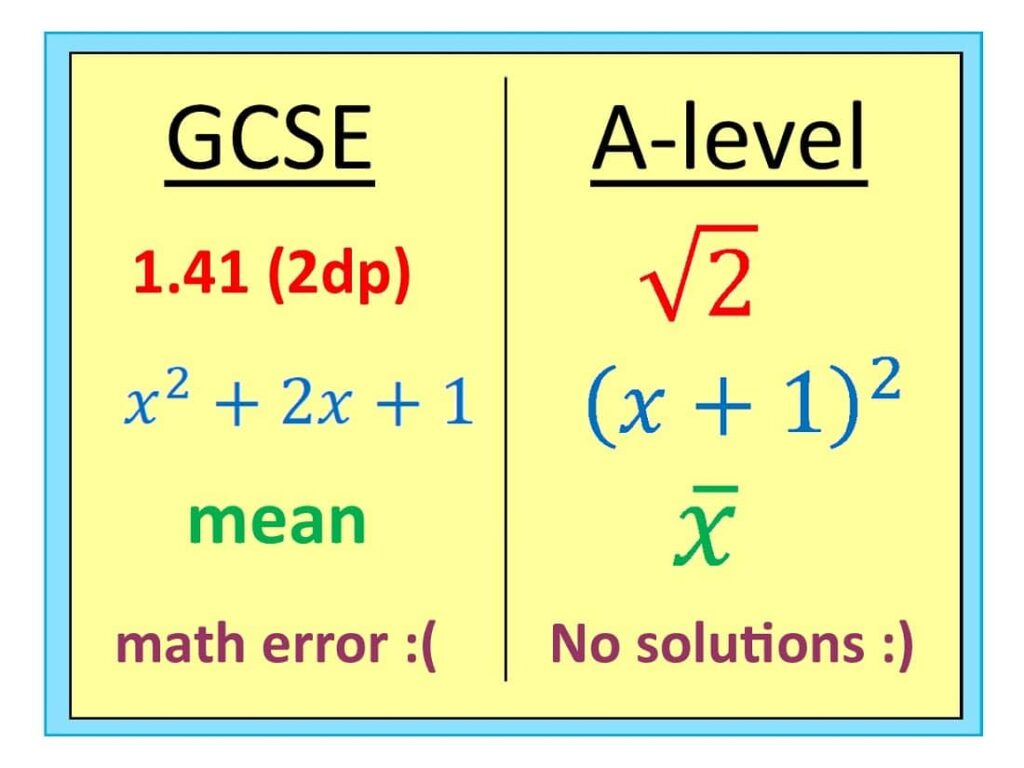O Levels and A Levels are important stages in a student’s education, but they’re different.
O Levels are usually taken at age 16 after Secondary 2. They test basic knowledge in around 10 subjects, covering a wide range of topics. O Levels show that you’ve moved from lower to upper secondary school.
A Levels are typically done at age 18 after Secondary 4. They focus on 3-4 subjects that you’ve chosen, testing how well you understand them. A Levels are really important for getting into college and starting your career. They open up opportunities for further education and jobs.
How does O levels maths differ from other exams?

O Levels maths differs from other exams in several key ways. Firstly, O Levels maths typically covers a broader range of mathematical topics compared to other exams.
It encompasses fundamental concepts such as algebra, geometry, trigonometry, and basic calculus principles, providing students with a comprehensive understanding of mathematics.
Secondly, O Levels maths exams are designed to assess not only students’ knowledge of mathematical concepts but also their ability to apply these concepts in problem-solving situations. The exams often include a mix of multiple-choice questions, short-answer questions, and problem-solving tasks, challenging students to think critically and analytically.
Additionally, O Levels maths exams are significant milestones in a student’s educational journey, marking the transition from lower to upper secondary curriculum. As such, they carry considerable weight in assessing students’ mathematical proficiency and readiness for advanced academic pursuits.
Common topics covered in O levels maths syllabus
The O Levels maths syllabus encompasses a wide range of topics aimed at providing students with a solid foundation in mathematics. Common topics covered include
- Arithmetic: Basic operations, fractions, decimals, percentages.
- Algebra: Linear equations, quadratic equations, simultaneous equations, inequalities.
- Geometry: Properties of shapes, angles, triangles, circles, area, and volume calculations.
- Trigonometry: Trigonometric ratios, sine, cosine, tangent, and their applications in solving triangles.
- Calculus: Basic differentiation and integration concepts may be introduced in some O Levels maths syllabi.
- Statistics and Probability: Data representation, measures of central tendency, probability concepts, and basic statistical analysis.
A levels and their role in higher education

A levels, or Advanced Level qualifications, are standardized exams typically taken by students around the age of 18, following the completion of Secondary 4.
These exams are widely recognized and serve as a crucial gateway to higher education opportunities. A levels are often required or preferred by universities and colleges as part of their admission criteria.
They provide students with the opportunity to specialize in specific subjects and demonstrate their academic aptitude and readiness for tertiary education.
The structure and format of A level maths exams
A level maths exams are structured to assess students’ understanding and proficiency in advanced mathematical concepts. The exams typically consist of multiple papers, each covering different aspects of mathematics.
These papers may include pure mathematics, mechanics, and statistics components, depending on the specific A level maths syllabus chosen by the student. The format of the exams may vary, but typically includes a mix of short-answer questions, extended-response questions, and problem-solving tasks.
A level maths exams are designed to challenge students to think critically, apply mathematical principles in practical contexts, and demonstrate their ability to solve complex problems.
A level maths syllabus compared to O levels
The A level maths syllabus is significantly more advanced and comprehensive compared to O levels. While O levels maths covers foundational mathematical topics, A level maths delves deeper into these concepts and introduces more complex and specialized topics.
For example, A level maths syllabi often include topics such as calculus, complex numbers, differential equations, and vectors, which are not typically covered at the O levels.
Additionally, A level maths exams require a higher level of mathematical reasoning, critical thinking, and problem-solving skills compared to O levels. The depth and complexity of the A level maths syllabus reflect the transition to higher education and prepare students for further studies in mathematics, science, engineering, and related fields.
How do you decide between O levels and A level maths?

Deciding between O levels and A level maths involves considering several factors to determine which option aligns best with your academic goals, abilities, and interests
Academic Preparedness
Assess your mathematical proficiency and readiness for advanced mathematical concepts. If you have a strong foundation in mathematics and excel in your studies, A level maths may be a suitable choice. However, if you require additional support or prefer a more gradual progression, O levels maths may be a better fit.
Future Academic and Career Aspirations
Consider your long-term academic and career goals. A level maths is often required or preferred for admission to universities and colleges, especially for courses in mathematics, science, engineering, and related fields. If you plan to pursue higher education in these areas, A level maths may be essential.
On the other hand, if you have different career aspirations that do not require advanced mathematical qualifications, O levels maths may suffice.
Interest and Motivation
Reflect on your interest and motivation in studying mathematics. A level maths involves more complex and specialized topics, requiring a higher level of commitment and dedication. If you have a genuine passion for mathematics and enjoy challenging yourself with advanced concepts, A level maths may be rewarding.
However, if you find mathematics challenging or lack enthusiasm for the subject, O levels maths may be a more comfortable option.
Consultation with Teachers and Advisors
Seek guidance from your teachers, academic advisors, or school counselors. They can provide valuable insights into your academic strengths and weaknesses, offer personalized recommendations based on your abilities and interests, and help you make an informed decision about which maths qualification to pursue.
Consideration of Personal Circumstances
Take into account your personal circumstances, such as time commitments, extracurricular activities, and other academic responsibilities. A level maths requires a significant investment of time and effort, so ensure that you have the necessary resources and support to manage your studies effectively.
FAQ
How much harder is A-level Maths than GCSE?
Generally, A-level Maths is considered more challenging than GCSE Maths.
A-level Maths involves more content, difficult concepts, and longer exams with abstract questions.
Which A-level is the easiest?
Opinions vary, but some subjects are often considered easier
- A-Level ICT: About 80.5% of students achieve a grade C or above.
- A-Level Sociology: It’s perceived as relatively straightforward.
- A-Level Environmental Science: Also considered less demanding.
Which country has the hardest A-level exams?
China conducts the Gaokao Exam, known as one of the hardest exams globally. Less than 0.25% of students qualify for elite colleges6.
Hong Kong also has challenging A-levels.
Does Harvard recognize A-levels?
Yes, Harvard formally accepts Cambridge International AS & A Levels, along with other Ivy League universities8.
Does MIT accept A-levels?
MIT accepts A-levels and recognizes their value in admissions.
What is O-Level GPA?
O-Level doesn’t have a GPA system. It’s a qualification taken in various countries, including the UK, Singapore, and Pakistan.
Is O-Level associated with Oxford or Cambridge?
O-Level is not specifically associated with either Oxford or Cambridge. It’s a general term for secondary education qualifications.
Do UK universities accept O-levels?
O-levels have been replaced by GCSEs in the UK. Universities consider GCSE results during admissions.
Wrapping Up
Choosing between O levels and A level maths depends on various factors like your academic strengths, career goals, and personal interests. O levels provide a solid foundation in mathematics, while A level maths offers a deeper dive into advanced concepts. Consider your readiness, aspirations, and support available to make the best decision for your future.
